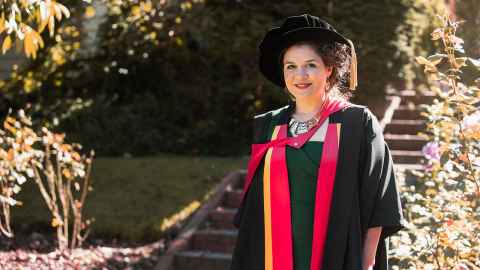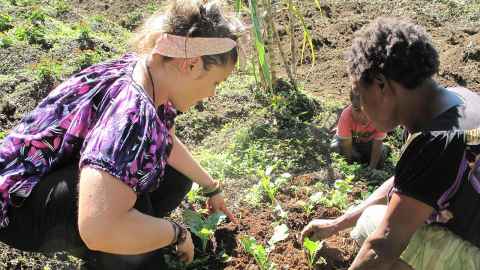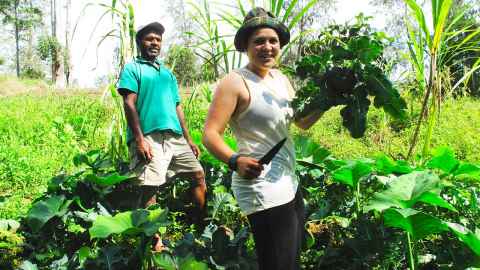Lessons in living from a vanishing world
21 May 2019
Living for almost a year in the Eastern Highlands of Papua New Guinea gave recent PhD graduate Olivia Barnett-Naghshineh rare insight into the impact of colonisation on food production and social systems.

Dr Olivia Barnett-Naghshineh graduated with a PhD in social anthropology from the University of Auckland this month. Her doctoral thesis investigated how food was being produced for an urban marketplace in Goroka, in the Eastern Highlands of Papua New Guinea (PNG). She was particularly interested in women and their social relationships — and the connection to food.
For her field research she spent around 11 months moving between Goroka, a mountainous town of around 30,000 in the Eastern Highlands, and various villages in the rural hinterlands that were growing food for the marketplace.
"I was mostly in a community of villages which grew Indigenous/local foods for ceremonial exchanges, and were also growing crops purely for the sake of selling. Highland people have been extremely sophisticated horticulturalists for at least 11,000 years, but things have been changing for them in the last few centuries, and especially now, with rapid urbanisation and the increasing commodification of food."

Olivia wanted to understand the marketplace from the perspective of people who actually use it rather than imposing any preconceived economic models. Beyond the basics of buying and selling, she discovered that crops like yams, sugarcane, taro and sweet potato are all exchanged at important moments like bridewealth ceremonies and deaths.
She was interested in how these foods represent particular emotions and relationships, and she focused in particular on a winged bean crop that grows tubers and is of very high social and ceremonial value.
"In the end, I argued that women do much of the main food production for the marketplace and ceremonial transactions, and also display important emotions that contribute to creating a ceremonial event, which is an integral part of the local economy. I called this 'the economy of recognition', where the humanity of others is continuously recognised and acknowledged in reciprocal ways."
She also noted the increasing use of fertilisers and pesticides used to grow introduced crops, like carrots, broccoli and cabbage. "These crops fetch a better price in the marketplace, but they also have a lasting negative impact on the dependency of food growers on imported commodities, and also on soil quality."
However, she says this type of crop production also allows people to send their children to school and increases their access to electricity, transport and other goods that make their lives easier in the modern world.
Beyond horticulture, Olivia was also interested in the daily lives of market women, and how the kinds of relationships they have with others — husbands, brothers and fathers — are made and maintained.
Everyone I met was extremely generous and went out of their way to take care of me. I came to appreciate how much Papua New Guineans value human life, and the importance of loving relationships to them.
"I found that men and women often worked together in complementary ways, however the increasing need for money has changed some of the gender dynamics and resulted in women doing more of the household labour while men find work in towns."
She says her time in the Highlands was very valuable, both professionally and personally. "I loved making new friends and family in Goroka, working in the gardens with the sun shining down, chatting and joking around with market women of all ages and discussing everything from our favourite songs and love lives to our family dynamics and emotions. Most of our communication was in Tok Pisin, the lingua franca of PNG and a type of Pidgin English. This is a fun language to speak, full of metaphors and good humour."
She also enjoyed the social dynamics of more collective living and how friends, neighbours and the families who 'adopted' her could always be relied on for company and good times.

"Everyone I met was extremely generous and went out of their way to take care of me. I came to appreciate how much Papua New Guineans value human life, and the importance of loving relationships to them.
"I also learnt that making sacrifices for others and showing affection through gifting and sharing food is fundamental to the moral economy in Goroka, although this is rapidly changing and in some ways, in decline."
To continue her connection to the people of the Eastern Highlands she has started planning a project, alongside local agriculturalists, anthropologists and cultural practitioners, based on the Indigenous winged bean plant; to maintain local seed varieties and knowledge about how it's grown.
She says her time in PNG also made her appreciate the similarities of the culture to aspects of her Iranian background. "I see these Indigenous values as fundamental to challenging the individualism and selfishness bred by capitalist ideology, and the alienation that capitalist economic systems lead to, where people tend to value their material lives more than their social relationships and even at times, their family members.''
Having now moved back to the UK to teach at Goldsmiths, University of London, she says her time in Aotearoa New Zealand and PNG brought home the damaging legacy of British imperialism and colonisation.
"This made a huge impact on me when I first arrived, and the ongoing processes of colonisation and dispossession that Indigenous people continue to experience, materially and psychologically, in both countries is deeply saddening. I hope to continue doing research, and to remain active in environmental and political struggles for fairer and more sustainable economies."
Olivia was supervised by Dr Mark Busse and Professor Cris Shore and her research was made possible through the support of the Marsden Fund.
Media queries
Julianne Evans | Media Adviser
Mob: 027 562 5868
Email: julianne.evans@auckland.ac.nz